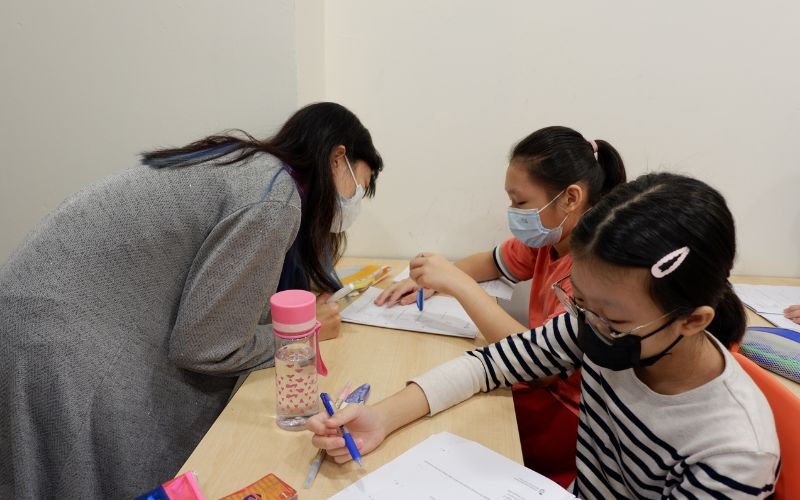How to Correctly Pronounce These 15 Commonly Mispronounced Words in PSLE Oral
- AGrader Learning Centre
- Jul 21, 2025
- 4 min read

Preparing for the PSLE Oral exam can feel daunting—not just for students but also for concerned parents watching their children strive for excellence in English. While students often practise reading aloud and tackling stimulus-based conversation, many overlook one critical element: pronunciation.
So, if your child is preparing for the PSLE Oral, now is the perfect time to fine-tune their pronunciation skills and tackle those easily mispronounced words with confidence.
Table of Contents:
Why Pronunciation Matters in PSLE Oral
In the English Oral PSLE, correct word pronunciation is essential. Examiners aren’t merely looking for fluent speech—they’re listening closely for accurate pronunciation, natural intonation, and clarity. Mispronounced words, even simple ones, can dent a student’s confidence and the examiner’s impression.
Whether it’s saying “Feb-yoo-ary” instead of “Feb-ru-ary” or dropping the “th” in “clothes,” these seemingly small errors can affect marks. And let’s face it—commonly mispronounced words are everywhere in the English language, even for native speakers.
Why Do Students Struggle with Pronunciation?
Before we dive into our list of tricky words, it’s important to understand why mispronunciation happens:
Bad speaking habits formed from casual speech (e.g., mumbling or slurring)
Influence from Singlish (e.g., “tink” instead of “think”)
Not opening the mouth wide enough, leading to unclear vowel sounds
Confusion from American English vs British English variations
Pronunciation isn’t just about saying a word correctly—it’s about clear communication skills, showing confidence and understanding in every sentence spoken.

15 Tricky Words & How to Pronounce Them Correctly
Word | Common mistake | Correct pronunciation | Practice sentence |
February | Feb-yoo-ary | Pronounce the “r”: Feb-ru-ary | The school will reopen in February after Chinese New Year. |
Wednesday | Wed-nes-day | Wens-day | We have PE on Wednesday every week. |
Vegetable | Vege-table | Vej-tuh-buhl | Eat more vegetables to stay healthy. |
Comfortable | Com-for-ta-ble | Comf-tuh-buhl | This chair is very comfortable to sit on. |
Library | Lie-bary | Pronounce the “r”: Lie-bra-ry | I borrowed a book from the library. |
Coupon | Kyu-pon | Koo-pon | I used a discount coupon to buy snacks. |
Pronunciation | Pro-noun-ciation | Pro-nun-ciation | Good pronunciation helps in oral exams. |
Salmon | Sal-mon | Silent “l”: Sa-muhn | My mother cooked grilled salmon for dinner. |
Receipt | Re-seep-t | Silent “p”: Re-seet | Remember to ask for a receipt after payment. |
Singapore | “Sing-ga-pore” (pore like “pour”) | Sing-uh-paw | Singapore is a clean and green city with many modern buildings. |
Genuine | Jen-yoo-win | Jen-yoo-in | He gave me a genuine apology. |
Jewellery | Jew-wuh-luh- ry | Jew-uhl-ree | She wore gold jewellery to the wedding. |
Clothes | Close | Pronounce the “th”: Klo-thz | He folded his clothes neatly. |
Mischievous | Mis-chee-vee-us | Mis-chee-vus | That mischievous boy is always up to no good. |
Breakfast | Break-fest | Brek-fuhst | I eat toast for breakfast. |
Pronunciation Tips
Open Your Mouth — Do Not Mumble
Many students mumble because they are shy or nervous. But mumbling makes your words unclear.
Open your mouth when you speak to let the sounds come out properly. This shows confidence and helps the examiner understand you.
Speak Slowly and Clearly
Rushing leads to careless mistakes. Slow down your speech to give yourself time to pronounce each word correctly.
It is better to pause and say it right than to rush and stumble.
Focus on Ending Sounds
Do not forget to pronounce the ending sounds of words, such as -t, -d, -s. For example:
“want” (not “wan”)
“played” (not “play”)
“cats” (not “cat”)
Watch Your “th” vs “t”
Many students say “tink” instead of “think”.
The “th” sound requires you to put your tongue between your teeth slightly. Practise saying:
think (not tink)
three (not tree)
thank (not tank)
Practise Reading Aloud Daily
One of the best ways to improve pronunciation is to read aloud every day.
Choose a short passage, read it slowly and clearly, and listen to how you pronounce tricky words.
Recording yourself and playing it back can help you spot mistakes.

Long-Term Benefits of Learning Correct Pronunciation
Investing time into improving your pronunciation pays off far beyond the PSLE. Here’s why:
Builds better communication skills
Boosts confidence when speaking in public or interviews
Helps with spelling and vocabulary acquisition
Prepares students to interact with native speakers
Reduces the influence of Singlish in formal contexts
English is full of easily mispronounced words—even for adults! But with daily practice, careful listening, and a little encouragement, your child can learn how to pronounce words correctly and make a lasting impression in their PSLE oral exam.
Remember, it’s not just about sounding “perfect.” It’s about being clear, confident, and understood.
Help your child master these 15 commonly mispronounced words in PSLE—and they’ll be well on their way to success.
AGrader’s Primary English Programme is thoughtfully crafted to help Primary 6 students excel in English. Each weekly lesson is carefully structured to stay ahead of the latest MOE syllabus, ensuring that students consistently learn beyond what’s taught in school. The programme is further enriched by AGrader’s high-quality, in-house worksheets, which offer clear, structured guidance from Primary 1 through to P6/PSLE levels.

Beyond regular lessons, students also benefit from complimentary access to EverLoop Modules—a powerful after-class learning platform. These exclusive resources are designed to reinforce key concepts, deepen understanding, and support long-term mastery, all without additional fees.
Enrol in AGrader’s Primary English Programme today and equip them with the skills, confidence, and support to excel in the PSLE and beyond.
Join Our AGrader Community Today! (Free for all AGrader & Non-AGrader students)
Join our Telegram and WhatsApp channels to gain access to more study tips, free downloads, and much more for all subjects.
- WhatsApp channel: https://bit.ly/agwachannel
- Telegram channel: https://bit.ly/agtelchannel
Feel free to explore more related topics in this section




Comments